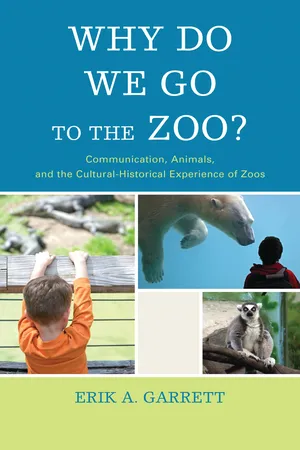
eBook - ePub
Why Do We Go to the Zoo?
Communication, Animals, and the Cultural-Historical Experience of Zoos
- English
- ePUB (mobile friendly)
- Available on iOS & Android
eBook - ePub
Why Do We Go to the Zoo?
Communication, Animals, and the Cultural-Historical Experience of Zoos
About this book
Despite hundreds of millions of visitors each year, zoos have remained outside of the realm of philosophical analysis. This lack of theoretical examination is interesting considering the paradoxical position within which a zoo is situated, being a space of animal confinement as well as a site that provides valuable tools for species conservation, public education, and entertainment. Why Do We Go to the Zoo? argues that the zoo is a legitimate space of academic inquiry. The modes of communication taking place at the zoo that keep drawing us back time and time again beg for a careful investigation. In this book, the meaning of the zoo as communicative space is explored.
This book relies on the phenomenological method from Edmund Husserl and a rhetorical approach to examine the interaction between people and animals in the zoo space. Phenomenology, the philosophy of examining the engaged everyday lived experience, is a natural method to use in the project. Despite its rich history and tradition it is interesting that there are very few books explaining "how to do" phenomenology. Why Do We Go to the Zoo? provides a detailed account of how to actually conduct a phenomenological analysis.
The author spent thousands of hours in zoos watching people and animals interact as well as talking with people both formally and informally. This book asks readers to bracket their preconceptions of what goes on in the zoo and, instead, to explore the meaning of powerful zoo experiences while reminding us of the troubled history of zoos.
This book relies on the phenomenological method from Edmund Husserl and a rhetorical approach to examine the interaction between people and animals in the zoo space. Phenomenology, the philosophy of examining the engaged everyday lived experience, is a natural method to use in the project. Despite its rich history and tradition it is interesting that there are very few books explaining "how to do" phenomenology. Why Do We Go to the Zoo? provides a detailed account of how to actually conduct a phenomenological analysis.
The author spent thousands of hours in zoos watching people and animals interact as well as talking with people both formally and informally. This book asks readers to bracket their preconceptions of what goes on in the zoo and, instead, to explore the meaning of powerful zoo experiences while reminding us of the troubled history of zoos.
Frequently asked questions
Yes, you can cancel anytime from the Subscription tab in your account settings on the Perlego website. Your subscription will stay active until the end of your current billing period. Learn how to cancel your subscription.
No, books cannot be downloaded as external files, such as PDFs, for use outside of Perlego. However, you can download books within the Perlego app for offline reading on mobile or tablet. Learn more here.
Perlego offers two plans: Essential and Complete
- Essential is ideal for learners and professionals who enjoy exploring a wide range of subjects. Access the Essential Library with 800,000+ trusted titles and best-sellers across business, personal growth, and the humanities. Includes unlimited reading time and Standard Read Aloud voice.
- Complete: Perfect for advanced learners and researchers needing full, unrestricted access. Unlock 1.4M+ books across hundreds of subjects, including academic and specialized titles. The Complete Plan also includes advanced features like Premium Read Aloud and Research Assistant.
We are an online textbook subscription service, where you can get access to an entire online library for less than the price of a single book per month. With over 1 million books across 1000+ topics, we’ve got you covered! Learn more here.
Look out for the read-aloud symbol on your next book to see if you can listen to it. The read-aloud tool reads text aloud for you, highlighting the text as it is being read. You can pause it, speed it up and slow it down. Learn more here.
Yes! You can use the Perlego app on both iOS or Android devices to read anytime, anywhere — even offline. Perfect for commutes or when you’re on the go.
Please note we cannot support devices running on iOS 13 and Android 7 or earlier. Learn more about using the app.
Please note we cannot support devices running on iOS 13 and Android 7 or earlier. Learn more about using the app.
Yes, you can access Why Do We Go to the Zoo? by Erik A. Garrett in PDF and/or ePUB format, as well as other popular books in Philosophy & Existentialism in Philosophy. We have over one million books available in our catalogue for you to explore.
Information
Table of contents
- Title Page
- Acknowledgments
- Knutmania
- Displaying the Phenomenological Method
- Phenomenology and the Life-World of Animals
- Let’s Go to the Zoo
- Bracketing
- Rhetoric and Synecdoche
- Playing at the Zoo and Kinesthesia
- Zoos’ Troubled Origin
- Epilogue
- Bibliography
- Index
- About the Author